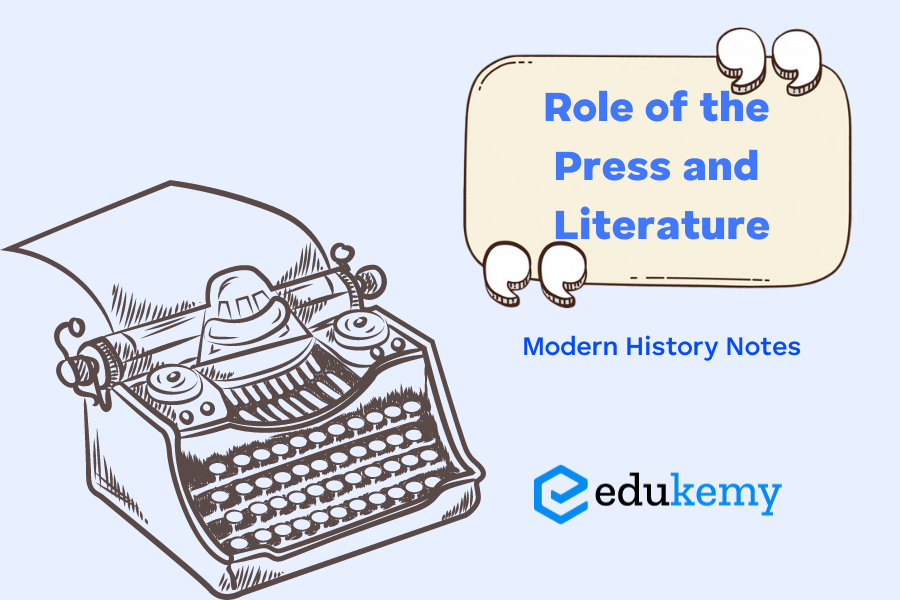- The press and literature played a crucial role in spreading the message of patriotism, promoting modern ideas, and fostering a sense of national consciousness during the nationalist movement in India. Here are the key points regarding the role of the press and literature:
- The Power of the Press: The press was the chief instrument through which nationalist-minded Indians conveyed their ideas and criticisms of official policies. Nationalist newspapers emerged across various regions of India, providing a platform to express the Indian point of view, criticize colonial policies, and advocate for national welfare. These newspapers played a vital role in disseminating ideas of self-government, democracy, and industrialization among the people.
- Prominent Nationalist Newspapers: Several prominent nationalist newspapers emerged during this period. In Bengal, newspapers like the Hindu Patriot, the Amrita Bazar Patrika, the Indian Mirror, the Bengalee, the Som Prakash, and the Sanjivani were influential. In Bombay, newspapers such as the Rast Goftar, the Native Opinion, the Indu Prakash, the Mahratta, and the Kesari were significant. Similarly, in Madras, newspapers like the Hindu, the Swadesamitran, the Andhra Prakasika, and the Kerala Patrika played a role. Other notable newspapers included the Advocate, the Hindustani, the Azad, the Tribune, the Akhbar-i-Am, and the Koh-i-Noor, which operated in different parts of India.
- National Literature: Nationalist literature, including novels, essays, and patriotic poetry, also played a crucial role in arousing national consciousness. Prominent writers such as Bankim Chandra Chatterjee and Rabindranath Tagore in Bengali, Lakshminath Bezbarua in Assamese, Vishnu Shastri Chiplunkar in Marathi, Subramanya Bharati in Tamil, Bharatendu Harishchandra in Hindi, and Altaf Husain Hah in Urdu emerged during this period. Their literary works evoked a sense of pride, highlighted social and political issues, and inspired people to work towards national awakening and freedom.
- In summary, the press and literature were powerful mediums for disseminating nationalist ideas, criticizing colonial policies, and fostering a sense of national consciousness during the nationalist movement in India. Newspapers provided a platform for expressing the Indian point of view, while literary works played a significant role in evoking patriotic sentiments and addressing social and political issues. The press and literature acted as catalysts in uniting people and spreading the message of independence and progress throughout the country.
Contents
- 1 Frequently Asked Questions (FAQs)
- 1.1 1. Q: What was the significance of the press in the Indian National Movement during the 20th century?
- 1.2 2. Q: How did literature contribute to the nationalist sentiment in colonial India?
- 1.3 3. Q: How did the press contribute to the spread of education and social reform movements in pre-independent India?
- 2 In case you still have your doubts, contact us on 9811333901.
Frequently Asked Questions (FAQs)
1. Q: What was the significance of the press in the Indian National Movement during the 20th century?
A: The press played a pivotal role in the Indian National Movement by serving as a powerful tool for disseminating information, shaping public opinion, and mobilizing masses. Newspapers like “The Hindustan Times” and “The Indian Express” became platforms for nationalist leaders to express their views and grievances against British rule. Editors like Bal Gangadhar Tilak used their publications to advocate for Swaraj (self-rule) and criticize oppressive British policies. The press united diverse communities, fostering a sense of national identity and solidarity, thereby contributing significantly to the momentum of the freedom struggle.
2. Q: How did literature contribute to the nationalist sentiment in colonial India?
A: Literature played a crucial role in fostering nationalist sentiment during colonial India. Writers and poets used their literary works to critique colonial policies and highlight the socio-economic injustices faced by the Indian population. Rabindranath Tagore’s writings, such as “Gitanjali,” not only expressed the beauty of Indian culture but also subtly conveyed the need for freedom and self-determination. Nationalist literature served as a medium to inspire and instill a sense of pride in Indian heritage, encouraging individuals to question colonial subjugation and envision an independent India.
A: The press played a pivotal role in promoting education and social reforms in pre-independent India. Newspapers and journals dedicated sections to articles on social issues, highlighting the need for reforms in areas such as caste discrimination, child marriage, and women’s rights. Notable reformers like Raja Ram Mohan Roy used publications like “Sambad Kaumudi” to advocate for social change and education. By disseminating information on these issues, the press became a catalyst for awareness and activism, contributing significantly to the broader social reform movements that aimed to bring about a more just and equitable society.
In case you still have your doubts, contact us on 9811333901.
For UPSC Prelims Resources, Click here
For Daily Updates and Study Material:
Join our Telegram Channel – Edukemy for IAS
- 1. Learn through Videos – here
- 2. Be Exam Ready by Practicing Daily MCQs – here
- 3. Daily Newsletter – Get all your Current Affairs Covered – here
- 4. Mains Answer Writing Practice – here

